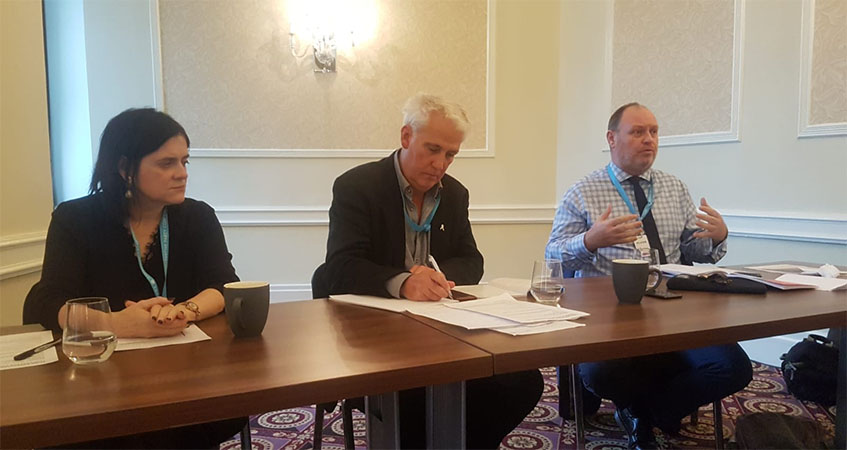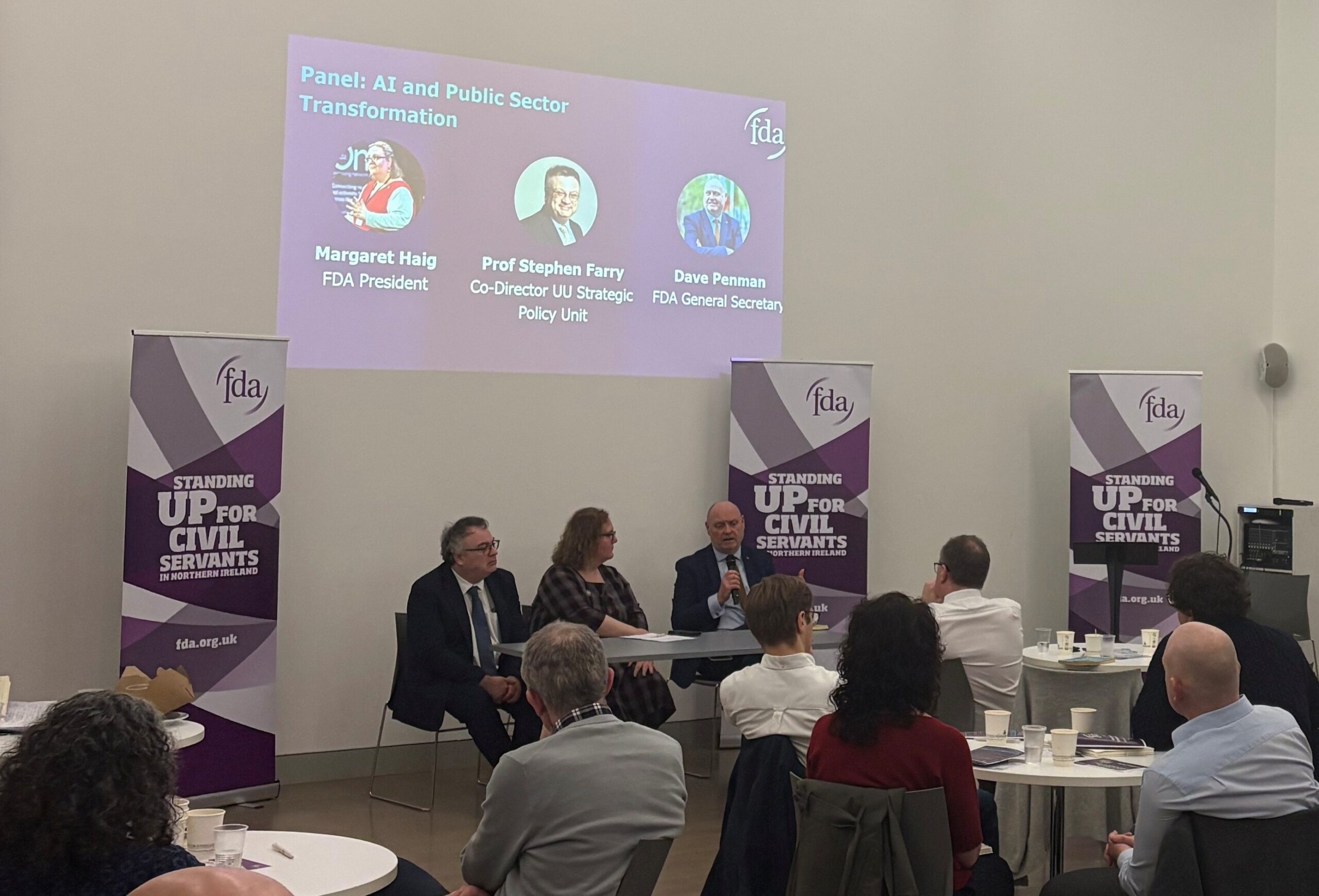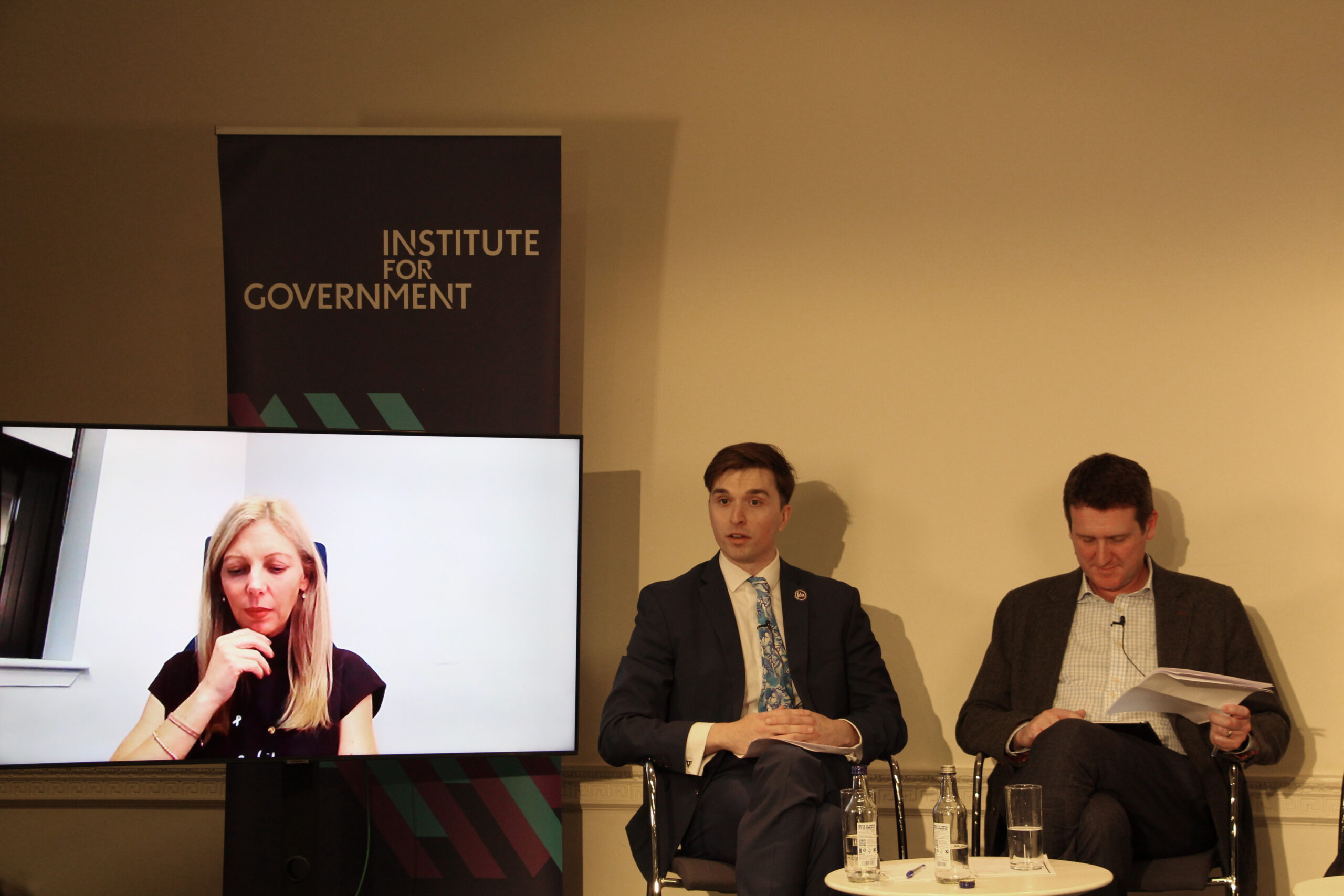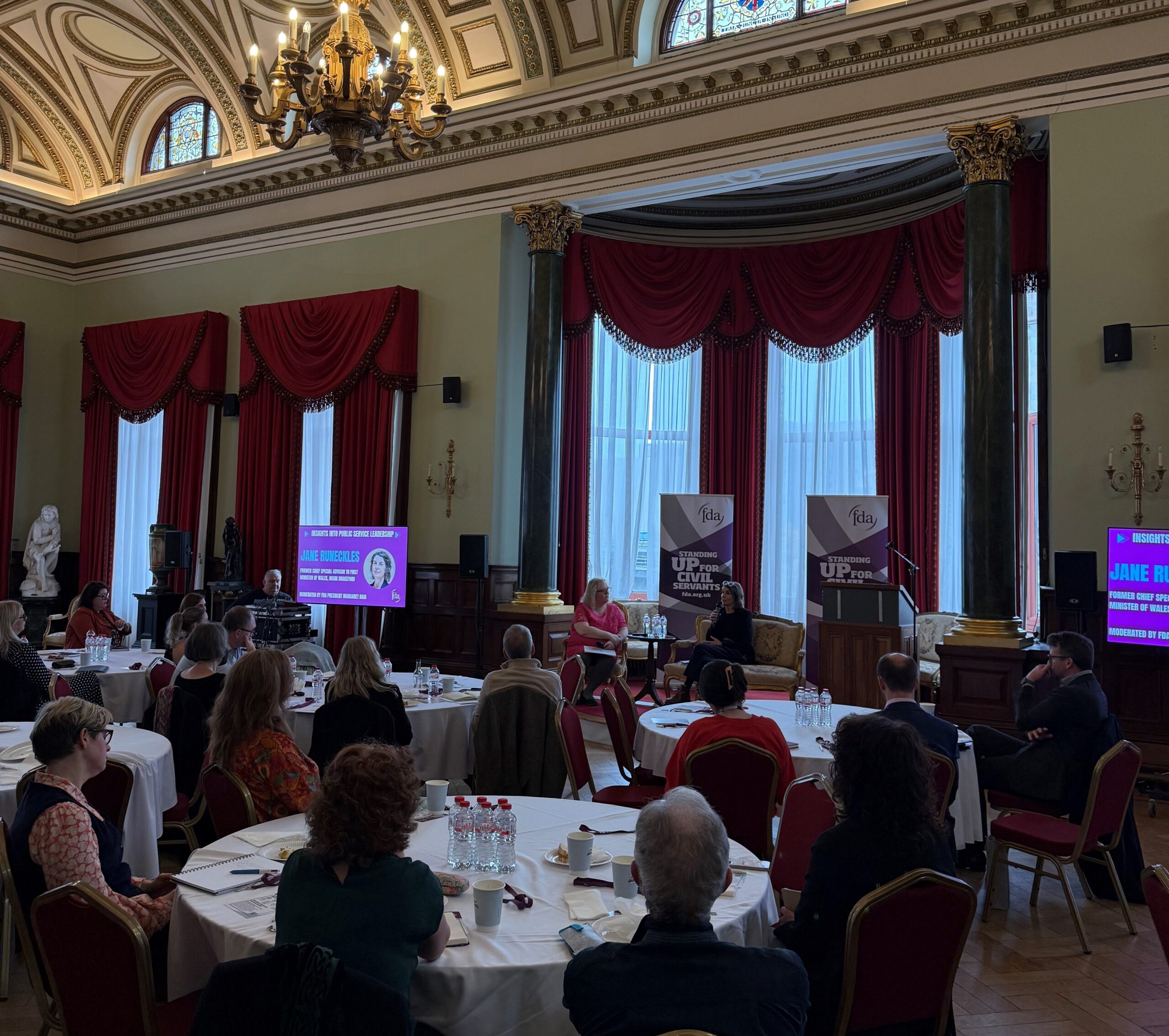FDA to Conservatives: Attacks on civil service undermine your ability to govern

In the midst of political turmoil – with Tories split between their conference and a no-longer-prorogued Parliament – FDA General Secretary Dave Penman explained to the Conservative party why the nation needs an impartial civil service.
For the third time this year, Penman spoke at a political party’s conference fringe event. Joined by Institute for Government (IfG) Director Bronwen Maddox and Smith Institute Deputy Director Steve Barwick, the General Secretary set out to answer one question: can the Conservatives trust the civil service?
Barwick opened the event by speaking about the Smith Institute’s recent report looking into the importance of civil service impartiality. Commissioned by the FDA, the work is comprised of essays from ministers and former ministers across the political spectrum, as well as high-profile former civil servants and other experts of the field. Many of the contributors, Barwick noted, made the point that “in our post-truth age, it is really important that independent, expert advice is at the heart of government”.
Maddox then spoke about how civil service impartiality – which she felt might have, a year or two ago, seemed like an “abstract topic” – feels like a “very, very live” one today. She explained that many people “either senior in government or the opposition” wonder if they can trust the civil service, “whose views they presume to know, and whose individual politics they presume to be equivalent to their professional behaviour”. In many instances, direct allegations have been made accusing civil servants of being partial, whether the debate on “Mark Sedwill’s role in defenestrating Gavin Williamson”, or questions about the economic advice from the Treasury about the impact of Brexit on the economy. “What we see in this very heated time,” she remarked, is that the civil service’s statements or actions are likely to “be considered deeply offensive by one side or the other”.
Impartiality, she reminded the room, is not the same thing as neutrality. The civil service is there to “make an argument” about what is best for the country. When these views surface – “particularly when there isn’t a clear line from the government” – the service is left “very vulnerable to being attacked for having come out with what one side or the other might feel is a political view”.
Maddox reasoned, however, that the flexibility of the civil service is one of the strongest counter-arguments it could make against such attacks. It has, after all, “supported all kinds of changes of view and policy”, and moved from the ideas of Thatcher, to those of Blair, to those of the coalition “and so on”.
However, the IfG Director also acknowledged the argument that some politicians feel they need a core team of political appointees who can “reflect back to you” the change you’re trying to achieve.
The case for an independent civil service, she explained, therefore needs to be made. Ministers at all levels need impartial advice; they need someone speaking truth to power; they need continuing expertise – the kind you get from a permanent service. Maddox criticised Yes Minister as having been “really damaging” in its portrayal of civil servants “trying secretly to block ministers”. In her experience, it was more often the case that they were keen to please whichever new minister was “just parachuted” in.
Maddox was clear that ministers and the Prime Minister should not attack the civil service, which only serves to “undermine the government itself”. She added that the Cabinet Secretary has begun to speak out for the civil service, as the person to defend its “ethics and ethos” to the country. Such things, she noted, need saying in public in “a way it perhaps didn’t need saying in the past”. Finally, she explained that rapid turnover within the civil service was in itself a problem. Recognising that this is a direct result of pay and promotion policies, which often mean civil servants can only get a raise by moving to a new role, Maddox nevertheless thinks this pattern and mindset could be “destructive” to the “acquisition of knowledge that the civil service needs”, and in itself undermine the institution’s own expertise.
The FDA General Secretary explained that the union’s founding principles states it exists to “defend civil servants, but also to defend the civil service”. That duty, which “we’ve taken up for a hundred years”, was one of the reasons he was in that room.
Penman acknowledged that even before Brexit, people had questioned civil service impartiality. For example, during the Scottish referendum, it was asked how “a single civil service” could “support two governments with completely opposing views”. But the civil service, Penman explained, is there to provide “impartial, objective, factual advice” to their minister. “It’s there to provide that advice, to give options to ministers, and then when ministers decide” on a course of action (“as only ministers can decide”), it is the “the job of the civil service is to go and to deliver whatever that decision is”. Those who are members of the FDA “know that you’re going to be advising on policy that you may or may not agree with, you’re going to have to work with governments that you may or may not have voted for”. The idea that the civil service is “a partisan force looking to try and delivers its own objective,” Penman carried on, “is simply a falsehood, and an absolutely damaging” one at that.
“To see accusations even from the despatch box, to see a government minister stand up and ridicule the government’s own analysis around Brexit,” the General Secretary said, has been “damaging to the reputation of the civil service”. Years of trashing the integrity and professionalism of the civil service will lead to issues post-Brexit, when government tries to implement new, big projects. In addition to the general dismissal of the institution, the cumulative force of attacks on individuals – Conservative party members speaking about “trying civil servants for treason” and calls of “hang him” when one civil servant’s name was mentioned at a Tory MP’s meeting – will turn people away from a career in the civil service. “Many of the brightest” people you would want to work in government would “look at this and say: ‘why would I want to volunteer for that’?”
“Silence is not good enough,” Penman said. “Ministers and Prime Ministers and members of Parliament should be defending the civil service. They should not be making baseless accusations of partisanship or bias. If that’s allowed to continue, all you’re doing is undermining your ability to govern in the future.”
Maddox and Penman also took questions from the room. One attendee, with a background as a historian, noted that as “civil servants are products of their own societies”, is there not a risk that “what might seem impartial to someone in London or Edinburgh” is different to someone “in the Orkneys or Cornwall”? Penman agreed that the civil service could do better at “diversifying the core of those who get to the most senior ranks”, while noting that they are “working hard on that” (and that the FDA has done work to encourage graduates from a wider range of universities to apply for the Fast Stream).
The speakers were asked about making the civil service less London-centric, and Maddox said that she thought “there’s going to be more and more clamour for devolution and decentralisation within England”, but noted that this needed to also involve the decentralisation of “politics and money” to different areas. Penman agreed that this movement was “all more possible now given the advances of technology”, and that it would help ensure a “range of backgrounds” was represented within the civil service.
Journalist Michael Crick asked the panel about the former civil servants in the House of Lords participating in the Brexit debate. When the majority of these individuals have “revealed themselves as remain”, would it be unreasonable to assume they felt the same when in government, and to think “their successors in government hold similar views”?
Penman answered that these people are no longer civil servants, but parliamentarians. “I don’t have a problem with ex-Cabinet Secretaries in the House of Lords making a comment about a political issue,” he said, but he does have a problem with that view being seen to “represent the current civil service”. Moreover, he elaborated, if you’re a civil servant it doesn’t matter if you voted for Brexit or not: no matter your personal views, you will still uphold your duty of impartiality in your professional work.
Barwick ended the event with some telling statistics. According to a Smith Institute/Com Res survey, “90% of MPs agree that effective governance in the UK depends on an impartial civil service providing evidence-based advice to ministers,” while “three quarters of MPs recognise attacks on impartiality have increased over the past three years”. There was also “near unanimous agreement” that “MPs see defending the civil service as the responsibility of the Prime Minister and the government.”
Interested in the debates from the other party conferences? Read the reports from the Liberal Democrat, Labour and SNP fringe events.
Related News
-

FDA’s annual NI conference takes place in Belfast
FDA members in Northern Ireland had the opportunity to hear directly from two current Finance Ministers; Minister of Finance in NI Executive, John O’Dowd MLA and Cabinet Secretary for Finance and the Welsh Language, Mark Drakeford at the FDA NI Section’s annual conference.
-

FDA calls for pay parity on IfG panel discussing Fast Stream reform
FDA National Officer for the Fast Stream Robert Eagleton took part in the Institute for Government’s (IfG) panel event, ‘How can the Fast Stream deliver more for the civil service?’.
-

FDA’s inaugural Insights into Public Service Leadership conference takes place in Belfast
The FDA Northern Ireland section held the inaugural ‘Insights into Public Service Leadership’ half-day conference and networking on Thursday 16 October 2025 for members and non-members in NI.